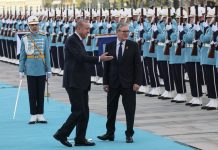Meet Nadia Murad, the Yazidi girl who survived the atrocities by the ISIS and a went on win the Nobel Peace Prize. Nadia Murad was taken hostage by ISIS Militants in 2014 but escaped. The 25-year-old won the Nobel in October alongside Congolese doctor Denis Mukwege for their “efforts to end the use of sexual violence as a weapon of war”.
“For me, justice doesn’t mean killing all of the ISIS members who committed these crimes against us,” she said shortly after winning, using an Arabic acronym for IS.
“Justice for me is taking Daesh members to a court of law and seeing them in court admitting to the crimes they committed against Yazidis and being punished for those crimes specifically,” she said.
Murad once lived a quiet life in her village in the mountainous Yazidi stronghold of Sinjar in northern Iraq, close to the border with Syria.
But when the jihadists stormed across swathes of the two countries in August 2014, her nightmare began.
IS fighters swept into her village, Kojo, killing the men, taking children captive to train them as fighters and condemning thousands of women to a life of forced labour and sexual slavery.
Murad was taken to Mosul, the Iraqi “capital” of the IS’s self-declared caliphate, where she was held captive and repeatedly gang-raped, tortured and beaten.
IS fighters wanted “to take our honour, but they lost their honour”, said Murad, now a United Nations goodwill ambassador for survivors of human trafficking. For the jihadists, with their ultra-strict interpretation of Islam, the Yazidis are seen as heretics. The Kurdish-speaking community follows an ancient religion, revering a single God and the “leader of the angels”, represented by a peacock.
Like thousands of Yazidis, Murad was sold and forcibly married to a jihadist, beaten and — in contrast to the official wives of IS leaders — forced to wear makeup and tight clothes, an experience she later related in front of the United Nations Security Council.
“The first thing they did was they forced us to convert to Islam,” Murad told AFP in 2016. She set about trying to escape, and managed to flee with the help of a Muslim family from Mosul.
Using false identity papers, she crossed the few dozen kilometres (miles) to Iraqi Kurdistan, joining crowds of other displaced Yazidis in camps. There, she learnt that six of her brothers and her mother had been killed. With the help of an organisation that assists Yazidis, she was re-united with her sister in Germany, where she lives today.
Even there, she says she is still fearful, for herself and other innocent women. “I am a joyful person, I am an outgoing person, I don’t want to live in fear,” she told reporters at a press conference on Sunday.
The Yazidis numbered around 550,000 in Iraq before 2014, but some 100,000 have since left the country.
Many others who fled their hometowns to Iraqi Kurdistan remain reluctant to return to their traditional lands. Murad has dedicated herself to what she calls “our peoples’ fight”.
She and her friend Lamia Haji Bashar, joint recipients of the EU’s 2016 Sakharov human rights prize, have advocated to reveal the fate of some 3,000 Yazidis who remain missing, presumed still in captivity.
She has also campaigned for displaced Yazidis to be taken in by European countries and for the acts committed by IS to be recognised internationally as genocide.
The Yazidi cause has won a high-profile supporter — Lebanese-British lawyer and rights activist Amal Clooney, who also penned the foreword to Murad’s book, “The Last Girl”, published in 2017.
That same year, the UN announced it would begin gathering evidence on IS war crimes, crimes against humanity or genocide that would be used to try IS militants in Iraqi courts.
Announcing the Nobel winners in October, committee chairwoman Berit Reiss-Andersen said: “A more peaceful world can only be achieved if women and their fundamental rights and security are recognised and protected in war.”
Murad was in the United States when she heard about her prize, and said she was “scared” initially. “The first thing that came to my mind was my mother, I cried a lot,” she said on Sunday.
“It was very difficult. I have received the Nobel Peace Prize from the hardship, the difficulties that all these people have been faced with and from all the hard work that we have been doing.” In contrast to all the tragedies that have befallen her, recent pictures on Murad’s Twitter feed show happier times.
In August, she announced her engagement to fellow Yazidi activist Abid Shamdeen. “The struggle of our people brought us together & we will continue this path together,” she wrote. Underneath, a photo showed her next to a young man in a bow tie, her face still framed by her long brown hair, but this time, bearing a broad smile.




